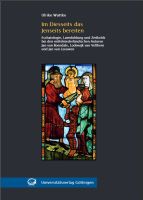Im Diesseits das Jenseits bereiten - Eschatologie, Laienbildung und Zeitkritik bei den mittelniederländischen Autoren Jan van Boendale, Lodewijk van Velthem und Jan van Leeuwen
Author(s)
Wuttke, Ulrike,
Collection
AG UniversitätsverlageLanguage
GermanAbstract
This study reveals that in medieval Dutch vernacular texts (from the Brabantine authors Jan van Boendale, Lodewijk van Velthem, and Jan van Leeuwen, and in the anonymous Boek van Sidrac) the treatment of individual and universal eschatological topics and themes, such as death, heaven, hell, purgatory, the Antichrist, eschatological people, and Judgement Day is dedicated to moral and ethical guidance to prepare oneself during lifetime for the afterlife. Central to all texts is the fate of the souls in the afterlife and guidelines to assure redemption on Judgment Day. This includes the ability to recognize the signs of the End properly. The vernacular eschatological discourse is considered as an inherent part of the intellectual emancipation of the laity in the later Middle Ages. This book is of interest not only to Dutch and German philologists, but also to historians and anyone interested in the history of religion, especially of eschatology and apocalypticism. This study was awarded with the 2013 Mgr. C. de Clercqprijs of the Koninklijke Vlaamse Academie van België voor Wetenschappen en Kunsten (Royal Flemish Academy of Belgium for Science and the Arts) for an outstanding work in the field 'History of Religions of Flanders'. Im „europäischen Krisenjahrhundert“ zwischen dem frühen 14. und dem 15. Jh. gerieten in zeitgenössischer Wahrnehmung auch alltägliche Lebensbereiche aus dem Gleichgewicht. Seit dem 13. Jh. verstärkt in Lateineuropa aufgekommene Bedürfnisse, sich mit Lebenssinn und Ewigkeitshoffnung auseinanderzusetzen, verstärkten sich. Gemessen an dem Maß, in dem vielfach volkssprachige prophetische und eschatologische Texte (DEM spätmittelalterlichen Medium der Gegenwartsbewältigung und Zukunftsplanung) zu den bis dahin lateinischen hinzutraten, ergriff dies viel breitere soziale Schichten, nicht zuletzt städtische Kreise. Aus Flandern, einem der wichtigsten städtischen Milieus der Zeit, stammen die Autoren der Texte, die Ulrike Wuttke in diesem bedeutenden Beitrag zu spätmittelalterlicher und frühreformatorischer Frömmigkeit und gesellschaftspolitischem Nachdenken von allen Seiten ebenso akribisch wie im Blick auf große Zusammenhänge erforscht hat. (Felicitas Schmieder, FernUniversität in Hagen) Ausgezeichnet mit dem Mgr. Charles De Clerqprijs 2013 für Flämische Religionsgeschichte der Koninklijke Vlaamse Academie van België voor Wetenschappen en Kunsten (Königliche Flämische Akademie Belgiens für Wissenschaften und Künste).
Keywords
history of religion; literature; literary studies; Antichrist; Eschatologie; Jüngstes Gericht; Mittelniederländische SpracheDOI
10.17875/gup-2016-974ISBN
9783863952747OCN
1030817113Publisher
Universitätsverlag GöttingenPublication date and place
2016Classification
Religion and beliefs


 Download
Download Web Shop
Web Shop